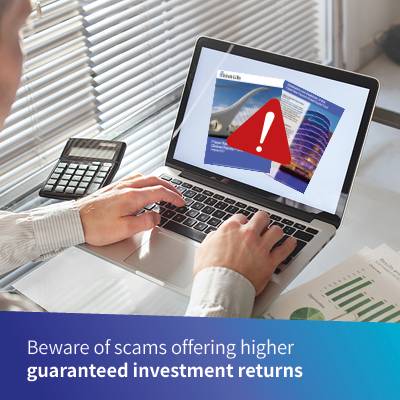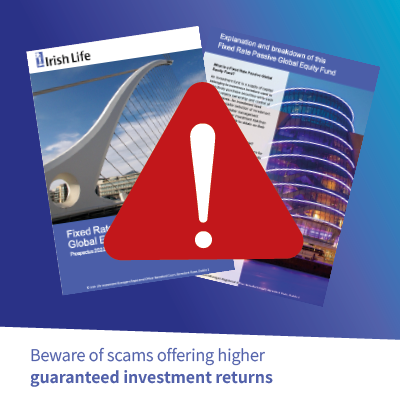Protect yourself from fraud
Financial fraud is on the increase in Ireland. The rise in digital payments and online transactions have opened new ways for criminals to make money. Some criminals are using sophisticated methods to persuade consumers to invest in fake investment and life insurance funds. We want to make sure we’re doing all we can to help you keep your money safe.
Below are some general tips on avoiding financial fraud. Please also see current known scams and checking if a financial provider is genuine for more specific information.

How to spot fraud
Protect your personal information
Criminals will likely ask you to reveal personal information over e-mail, websites, or phone. We will never ask you for personal information such as passwords or login information.
Is it too good to be true?
Many investment frauds promise high returns with little risk for the consumer. There is also usually a short investment deadline. This is designed to put consumers under pressure as they don’t want to miss out on an opportunity. Remember, if it seems too good to be true it probably is.
Suspicious communications
Criminals can create attractive product communications and websites pretending to be from large companies such as Irish Life. Look out for spelling mistakes or poor grammar as signs that it may not be genuine.
Cold calls and unsolicited e-mails
Irish Life will only contact consumers who have asked us to contact them or who hold products with us. If you are concerned contact from us might not be genuine, please e-mail corporateinvestigations@irishlife.ie.
Fake websites
Fraudsters can create investment websites which may look genuine and encourage you to give your details. So you may not suspect anything is wrong when they contact you. They may encourage you to set up investments with them, which turn out to be fake. If you are considering a new financial product, it’s important to always check the Central Bank’s list of authorised providers or call the Central Bank on 01 224 4000.

How can I check if a financial product provider is genuine?
Unfortunately, some financial criminals approach their victims pretending to a legitimate financial provider, financial adviser or broker. It’s important if you are contacted by a new financial professional that you check they are authorised.
- Providers of life, pension and investment services in Ireland must be authorised by the Central Bank. You can check their list of authorised providers here http://registers.centralbank.ie/ or call the Central Bank on 01 224 4000.
- If you have been contacted by somebody from Irish Life or about an Irish Life product and are unsure if is genuine, you can check by e-mailing us at corporateinvestigations@irishlife.ie.
Contacting Irish Life safely
The main contact details for Irish Life Financial Services customer service team are below
Phone: 01 704 1010
e-mail: customerservice@irishlife.ie
At Irish Life our customers’ security is our top priority. When you contact our customer service team, we will ask you security questions to check your identity. This includes your name, date of birth, address as well as other security questions. We will never ask you for any login information or passwords for accessing your products online.
Fraudulent activity to be aware of
We will keep this section up to date with potential frauds reported to us by consumers and our intermediaries.
March 2022 - Fraudulent Investment Product
Irish Life has become aware of fake product information being promoted by fraudsters.
This fraudulent product is called the “Fixed Rate Passive Global Equity Bond Prospectus 2022”. This is a scam and Irish Life does not offer any product by this name.
Members of the public should not engage with any person promoting this fraudulent investment scheme. Anyone who has been approached regarding this fraudulent product should notify Irish Life at corporateinvestigations@irishlife.ie or contact the Gardai.
Useful Websites